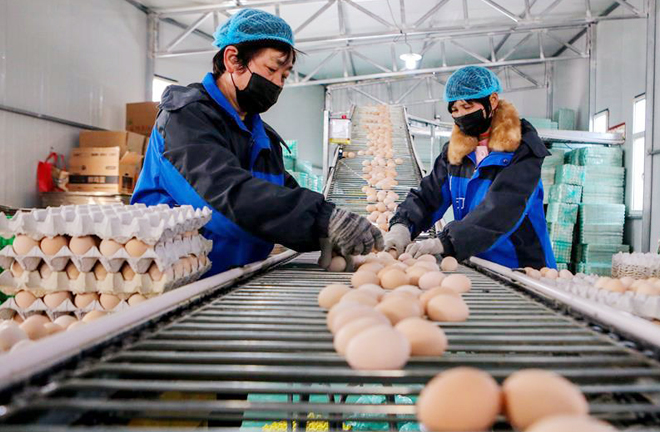China gradually resumes production amid epidemic control

Workers pack eggs at a company in Cheng’an County, north China’s Hebei Province, March 4. Hebei has been coordinating fodder supply and transportation support to help local livestock and poultry enterprises resume work amid epidemic prevention and control. Photo: Wang Xiao/XINHUA
Chinese President Xi Jinping on Feb. 23 stressed unremitting efforts in the prevention and control of the COVID-19 epidemic and coordination in advancing economic and social development.
Xi, also general secretary of the Communist Party of China (CPC) Central Committee and chairman of the Central Military Commission, made the remarks when delivering an important speech at a meeting in Beijing.
Xi said that Party committees and governments at all levels should continue to make unremitting efforts in various forms of prevention and control work and resume work and production in an orderly manner.
Efforts should be made to unleash the huge potential and powerful driving force of China’s development and to follow through on the goals and tasks of economic and social development this year, Xi said.
Yin Zhichao, dean of the School of Finance at Capital University of Economics and Business, said that it is urgent to send people back to work while ensuring epidemic prevention and control. This will allow the labor market to recover, thus meeting firms’ demand for labor. Economic operation relies on logistics, which can only resume unimpeded circulation when traffic and transportation recover.
“As more provinces have begun to report zero new confirmed cases of COVID-19, it is time to resume production and help people get back to their daily routine. This is highly important for meeting this year’s socio-economic development goals,” said Zhang Yi,?director of?the National Institute of Social Development?Strategy at the Chinese Academy of Social Sciences (CASS). Only by managing both the epidemic prevention and production resumption can we prevent the epidemic risk from turning into economic and social risks.
Resuming work and production in time not only cushions the epidemic’s short-term impact, but also helps realize our long-term development goals, said Wang Dehua, a research fellow from the National Academy of Economic Strategy at CASS. In addition, China’s production and supply chain plays an important role in the stable development of the global economy. Work resumption answers the urgent needs of opening up and the stabilization of the world economy.
Judging from historical experience, consumption is usually the first to be hit during an epidemic, said Fang Ying, a professor from the School of Economics at Xiamen University. To ease the impact, the government should consider stimulating consumption via more supportive fiscal and taxation policies and financial policies.
Local governments, enterprises and public institutions now face the arduous task of resuming production in an orderly manner while combating COVID-19. Zhang believed that the government should increase support for agricultural industries including cultivation, aquaculture and animal husbandry to prevent increased prices of agricultural products. An information channel should be opened as soon as possible to connect the labor force to companies with a labor shortage, and the problem of migrant workers’ transportation should be cleared through innovative epidemic prevention mechanisms to meet the needs of both labor supply and employment recruitment.
Yin suggested that the government should create a lenient environment for enterprises and reduce their direct costs by cutting taxes and fees. Apart from strongly supporting the enterprises that produce key materials for epidemic prevention and control, it is also necessary to support other businesses through monetary policies and to help the hardest-hit companies avoid capital chain rupture.
Qiao Baoyun, director of the China Academy of Public Finance and Policy at the Central University of Finance and Economics, said that China is transitioning from a growth model driven by factors of production and investment to high-quality development characterized by innovation. Prospects are promising. Although the epidemic is bound to hurt the economy to some extent, if handled properly, the damage will be short-term and won’t affect the positive long-term trend.
edited by WENG RONG
